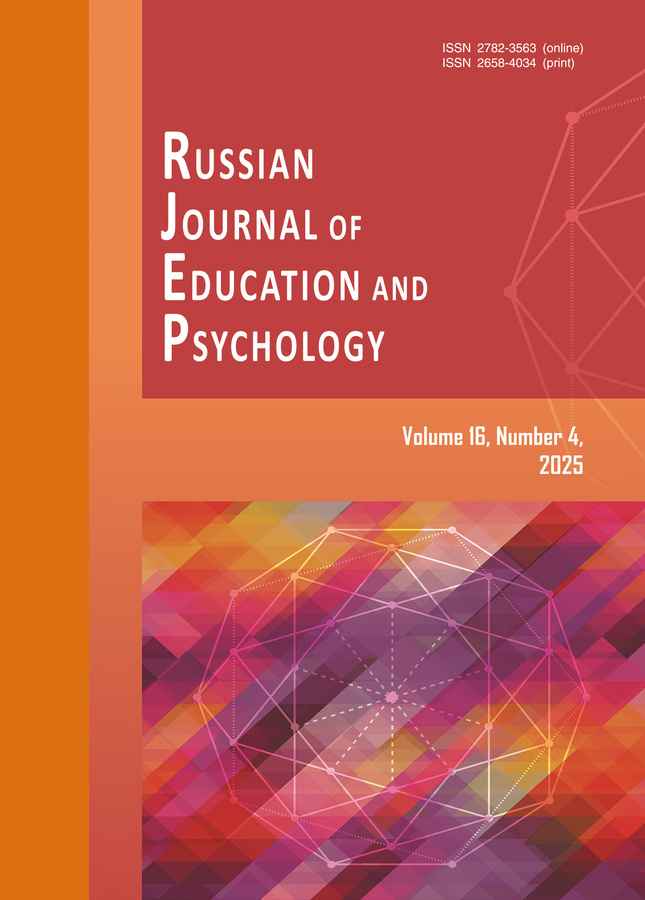A model for developing self-management competence in students
- 作者: Shestakova L.G.1, Lapenok M.V.2
-
隶属关系:
- Perm State University
- Financial University under the Government of the Russian Federation
- 期: 卷 16, 编号 4 (2025)
- 页面: 266-282
- 栏目: Educational and Pedagogical Studies
- ##submission.datePublished##: 30.09.2025
- URL: https://journal-vniispk.ru/2658-4034/article/view/349001
- DOI: https://doi.org/10.12731/2658-4034-2025-16-4-806
- EDN: https://elibrary.ru/LTJINX
- ID: 349001
如何引用文章
全文:
详细
Background. Formation of self-management competence in students is a relevant task, the solution of which requires targeted work. Self-management competence is understood as the ability to effectively set goals at various stages of life and manage available resources.
Purpose: development of a model for the formation of the self-management competence in students.
Materials and methods: theoretical analysis of literature, synthesis, modeling, experimental work. Wilcoxon T-test and Spearman rank correlation coefficient were used to process the data obtained during the experimental work.
Results. The model for developing students' self-management competence consists of four interconnected components: motivational, target, content-technological, and evaluative. The motivational component is aimed at creating and supporting students' motivation to master the self-management competence (improving the level). The target component represents the goal and levels of competence development. The content-technological component represents two interconnected blocks: content (theoretical knowledge about self-management, methods, techniques, tools (including digital ones), methods of using them) and procedural (a set of forms, methods, and types of work). The evaluative component is represented by materials for professor's assessment and student's self-assessment.
The effectiveness of the developed model is confirmed by the results of its implementation in the practice of teaching students. To identify the level of formation of self-management competence, the teacher's assessment and the students' self-assessment were used. The statistical significance of the results is confirmed by the obtained values of the Spearman rank correlation coefficient and the Wilcoxon T-criterion. The results of the study can be used in working with students of basic and additional educational programs.
作者简介
Lidia Shestakova
Perm State University
编辑信件的主要联系方式.
Email: shestakowa@yandex.ru
ORCID iD: 0000-0002-6823-4511
SPIN 代码: 4923-0097
Scopus 作者 ID: 57190008259
Researcher ID: F-4318-2019
PhD in Education, Associate Professor, Head of the Department of General Scientific Disciplines Chair
俄罗斯联邦, 44, Severnaya Str., Solikamsk, 618547, Russian Federation
Marina Lapenok
Financial University under the Government of the Russian Federation
Email: rina_l@mail.ru
ORCID iD: 0000-0001-9310-7322
SPIN 代码: 1560-6434
Dr in Education, Associate Professor, Professor of the Department of Business Informatics
俄罗斯联邦, 49, Leningradsky Prospekt, Moscow, 125167, Russian Federation
参考
- Akimova, L. V. (2021). Ability to temporal self-organization as a condition for developing students’ self-management skills. Russian Science and Education Today: Problems and Prospects, (4)(41), 43–48. EDN: https://elibrary.ru/WMJCFX
- Asyutina, O. N., & Kostyukova, T. A. (2022). Socio-humanitarian technologies of self-management as a way to enhance the effectiveness of university students’ independent work. Scientific and Pedagogical Review, (3)(43), 60–67. https://doi.org/10.23951/2307-6127-2022-3-60-67. EDN: https://elibrary.ru/LQLJXE
- Gaponova, G. I., Olshanskaya, S. A., & Lazarenko, L. A. (2 Newton 022). Psychological and pedagogical conditions for developing students’ abilities for self-organization and self-management. Problems of Modern Pedagogical Education, (74-4), 266–270. EDN: https://elibrary.ru/JOMUUQ
- Degterev, V. A. (2015). Self-management as a key competence for student personal development. Pedagogical Education in Russia, (3), 64–70. EDN: https://elibrary.ru/TWFIJV
- Kosinskaya, E. A. (2017). Developing self-management skills among students. Scientific Bulletin of Crimea, (2)(7), 8–16. EDN: https://elibrary.ru/YRXDEX
- Rudnev, I. Yu. (2023). Self-management — the key to successful learning for pedagogical university students in the context of educational system digitalization. Business. Education. Law, (2)(63), 402–408. https://doi.org/10.25683/VOLBI.2023.63.617. EDN: https://elibrary.ru/MQNJTW
- Savina, N. V. (2023). Student self-management in the context of personalized higher education. Problems of Modern Pedagogical Education, (81-2), 515–518. EDN: https://elibrary.ru/HIDNWF
- Chernykh, N. S., & Osipova, S. I. (2024). The essence and structure of student self-management competence. Bulletin of Kemerovo State University. Series: Humanities and Social Sciences, 8(1)(29), 100–108. https://doi.org/10.21603/2542-1840-2024-8-1-100-108. EDN: https://elibrary.ru/IOTKJE
- Chernykh, N. S. (2024). Pedagogical conditions for developing student self-management competence in the university educational process. Bulletin of Orenburg State University, (2)(242), 111–117. https://doi.org/10.25198/1814-6457-242-111. EDN: https://elibrary.ru/JCBWXM
- Shestakova, L. G., Lapenok, M. V., & Rozhina, I. V. (2024). A model for training future teachers in education quality management. Russian Journal of Education and Psychology, 15(1-2), 38–46. https://doi.org/10.12731/2658-4034-2024-15-1-2-38-46. EDN: https://elibrary.ru/KQCMNN
- Alieksieieva, S., Yershova, L., Kravets, S., Lapshyna, O., & Odnoroh, H. (2021). Self-education and self-management to develop entrepreneurship competence in future professionals. SHS Web of Conferences, 104, 03002, 1–7. https://doi.org/10.1051/shsconf/202110403002. EDN: https://elibrary.ru/EXSVVA
- Karelova, R. A. (2016). The development of self-management skills as the factor of the improvement of the readiness for professional flexibility. World Science, (4)(8), 52–54. EDN: https://elibrary.ru/VUBFRF
- Kulikov, A. S., & Gasanenko, E. A. (2023). Self-management as a condition for professional and personal development of university students. Problems of Modern Pedagogical Education, (81-4), 292–294. EDN: https://elibrary.ru/GVXSYL
- Neuland, M. (1998). The world of moderation. Kunzell: Neuland Verl. Für lebendiges Lernen. 306 p.
- Steyn, Z., & Van Staden, L. (2018). Investigating selected self-management competencies of managers. Acta Commercii, 18(1), 1–10. https://doi.org/10.4102/ac.v18i1.530
补充文件










